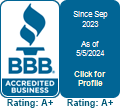Dealing with clogged drains isn’t just inconvenient – it can also be costly to fix. Clogs can arise from various factors and wreak havoc within your home. Though clogs can lead to significant damage, they can be rectified quite easily. Not only can you address the issue through different methods, but you can also take steps to prevent clogged drains by understanding the causes behind them. Learn five straightforward approaches to prevent clogged drains.
1. Avoid Pouring Oil Down the Drain
Experimenting with new cooking techniques and recipes can be enjoyable. A cook’s cleanup approach reflects their expertise, which includes the proper disposal of used cooking oils. The most crucial advice here is to refrain from pouring oil down the sink.
The consequences of pouring oil down a drain can be extensive. Oil can cling to pipes, and with repeated pouring, it can lead to blockages in the waterways.
A better way to dispose of used oil is to recycle it. After cooking, allow the oil to cool and pour it into an airtight container. Repeat this process until the container is full, then take it to a solid waste authority.
Recycled cooking oil is used to produce biodiesel, offering an eco-friendly alternative to petroleum-based diesel. Biodiesel has a smaller carbon footprint and is more sustainable than conventional diesel. By recycling used cooking oil, you can preserve your pipes.

REQUEST A FREE ESTIMATE
In a hurry? Contact us at (727) 479-4028
2. Proper Garbage Disposal Practices
Unfortunately, many individuals misuse garbage disposals. Some people even treat them as substitutes for trash cans, which can be hazardous if not used responsibly.
Garbage disposals aren’t designed to handle fibrous foods, large bone fragments, eggshells, fruit pits, coffee grounds, or ground coffee. Instead, use your garbage disposal for soft food items like eggshells and coffee grounds.
To prevent clogged drains after running cool water, remember to turn on the garbage disposal. Then, gradually add the food waste, and continue running water for a few minutes after you’re done. Neglecting to run water can result in improper disposal and potential drain blockage.
3. Regular Drain Cleaning
Home maintenance encompasses cleaning, disinfecting, and organizing every room. Regrettably, many people forget to include drains in this routine.
In your regular home maintenance to prevent clogged drains, make sure to clean the drains in your sinks and bathtubs. You can either purchase drain cleaners or create your own cleaning solution. To make your own cleaner, gather baking soda, white vinegar, or apple cider vinegar.
With your supplies ready, pour half a cup of baking soda and vinegar down the drain, allowing it to sit for around 15 minutes. During this time, the mixture will fizz – a sign that it’s working. Repeat the process, pouring the mixture outside the disposal as well. Don’t forget to clean the rubber components.
If you want to eliminate unpleasant odors, pour scented dishwashing fluid down the drain. Regular drain cleaning helps eliminate harmful bacteria such as E. coli or salmonella, promoting a safer environment. Understanding how to clean your drains is essential to maintaining open pipes and a hygienic setting.

REQUEST A FREE ESTIMATE
In a hurry? Contact us at (727) 479-4028
4. Employ a Mesh Stopper
Hair shedding is a natural occurrence, with fallen hair often ending up in the shower and subsequently down the drain. This can lead to clogs, particularly if you wash a significant amount of hair. However, there’s a solution to this problem.
Installing a mesh stopper in your drain acts as a barrier to prevent hair from entering the pipes. Placing the shower stopper is a straightforward task. Just remove the outer part of the drain and replace it with the mesh stopper. Remember to clean it weekly to maintain its effectiveness.
5. Monitor Water Pressure
Maintaining appropriate water pressure is crucial. Balanced water pressure ensures proper drain functioning and prevents pipe bursts. Excessively high pressure weakens pipes. To ensure a healthy flow, maintain pressure between 40 and 80 psi. Adequate water pressure in your home can deter drain clogs by sustaining a consistent and steady flow through pipes. Clogs are more likely during the winter, as the cold weather can cause oils to solidify within pipes.
Preventing Clogged Drains is Achievable
Experiencing clogged drains is never pleasant, but it’s a prevalent issue. Such problems can be costly and bothersome, especially when they could have been avoided. Our five tips are designed to be helpful, and we hope they assist you in preventing blocked drains. A little attention can go a long way in maintaining clear drains within your home!

REQUEST A FREE ESTIMATE
In a hurry? Contact us at (727) 479-4028
Conclusion
By following these simple steps like avoiding pouring oil down the drain, practicing proper garbage disposal habits, conducting regular drain cleaning, employing a mesh stopper, and monitoring water pressure, you can effectively prevent clogged drains and the associated inconveniences and expenses. Taking proactive measures in drain maintenance is key to a smoothly functioning plumbing system and a more hygienic home environment.
Prevent Clogged Drains Today
Do not let a clogged drains ruin your home. These tips will save your home plumbing system from further harm. Looking for licensed and dependable plumbers in Florida? You can rely on ClogKings to provide reliable and fast plumbing solutions. We will work with your schedule to ensure a hassle-free service.
Our Other Services
Clog King’s plumbers strive to provide great customer service from start to finish. Our services include:
- Drain Cleaning
- General Plumbing Repair
- Sewer Repair
- Sewer Replacement
- Tankless Water Heater Installation
- Toilet Repair
- Video Plumbing Inspection
- Water Heater Replacement
- Expert Water Softener Installation Services
- Water Filtration
Don’t let these problems disrupt your daily routine or cause further damage to your property! Take charge and call the royal experts at Clog Kings for top-notch plumbing solutions. Contact us today!


